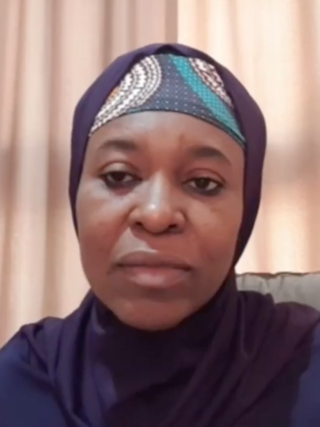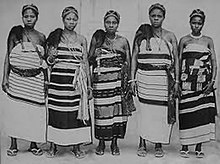
Muhammadu Buhari is a Nigerian statesman who served as the president of Nigeria from 2015 to 2023. A retired Nigerian Army major general, he served as the country's military head of state from 31 December 1983 to 27 August 1985, after taking power from the Shehu Shagari civilian government in a military coup d'état. The term Buharism is used to describe the authoritarian policies of his military regime.
Anarchism in Nigeria has its roots in the organization of various stateless societies that inhabited pre-colonial Nigeria, particularly among the Igbo people. After the British colonization of Nigeria, revolutionary syndicalism became a key factor in the anti-colonial resistance, although the trade union movement deradicalized and took a more reformist approach following the country's independence. The contemporary Nigerian anarchist movement finally emerged from the left-wing opposition to the military dictatorship in the late 1980s and saw the creation of the Awareness League.

Innocent Ujah Idibia MON, known by his stage name 2Baba and formerly as 2face Idibia, is a Nigerian singer-songwriter, record producer and philanthropist known for his solo debut album, Face 2 Face. He is regarded as the "most influential" in the Nigerian music industry following his contributions to Nigerian pop music in the 2000s.
John Olukayode Fayemi ; born 9 February 1965) is a Nigerian politician who served as governor of Ekiti State from 2018 to 2022. He previously served in office between 2010 and 2014 before losing re-election to Ayodele Fayose. He was also the Minister of Solid Minerals Development in President Muhammadu Buhari's cabinet from 11 November 2015 to 30 May 2018, when he resigned to contest for a second term as Governor of Ekiti State. He is the pioneer president of the Forum of Regions of Africa (FORAF) since 9 September 2022.

Human rights in Nigeria are protected under the current constitution of 1999. While Nigeria has made major improvements in human rights under this constitution, the American Human Rights Report of 2012 notes several areas where more improvement is needed, which includes: abuses by Boko Haram, killings by government forces, lack of social equality and issues with freedom of speech. The Human Rights Watch's 2015 World Report states that intensified violence by Boko Haram, restrictions of LGBT rights and government corruption continue to undermine the status of human rights in Nigeria.

Corruption is an anti-social attitude awarding improper privileges contrary to legal and moral norms and impairs the authorities' capacity to secure the welfare of all citizens. Corruption in Nigeria is a constant phenomenon. In 2012, Nigeria was estimated to have lost over $400 billion to corruption since its independence.

The Nigeria Police Force is the principal law enforcement and the lead security agency in Nigeria. Designated by the 1999 constitution as the national police of Nigeria with exclusive jurisdiction throughout the country, as at 2021 it has a staff strength of about 371,800. There are currently plans to increase the force to 650,000, adding 280,000 new recruits to the existing 370,000. The Nigeria Police Force is a very large organisation consisting of 36 State commands and Federal Capital Territory (FCT) grouped into 17 zones and 8 administrative organs. As at July 2024, the NPF is headed by IGP Kayode Egbetokun. In 2020, it underwent major overhauls.

Occupy Nigeria was a socio-political protest movement that began in Nigeria on Monday, 2 January 2012 in response to the fuel subsidy removal by the Federal Government of President Goodluck Jonathan on Sunday, 1 January 2012. Protests took place across the country, including in the cities of Kano, Surulere, Ojota, Abuja, Minna, and at the Nigerian High Commission in London. The protests have been characterised by civil disobedience, civil resistance, strike actions, demonstrations and online activism. The use of social media services such as Twitter and Facebook was a prominent feature of the protests. Post Occupy Nigeria and 2015, the Nigerian Government under the new president, Muhammadu Buhari have increased fuel prices from N87 to N145 with little resistant possibly due to the fact that Nigerians are beginning to realize that fuel subsidies are actually inimical to the country's growth rather than a mechanism towards helping the poor.

End SARS, widely written as #EndSARS, was a decentralised social movement and series of mass protests against police brutality in Nigeria that mainly occurred in 2020. The movement's slogan called for the disbandment of the Special Anti-Robbery Squad (SARS), a notorious unit of the Nigerian Police known for its long record of abuse against Nigerian citizens. The protests originated from a Twitter campaign in 2017, using the hashtag #EndSARS to demand the unit's disbandment by the Nigerian government. The movement experienced a resurgence in October 2020 following further revelations of the unit's abuses, leading to mass demonstrations across major cities in Nigeria, and widespread outrage on social media platforms. The hashtag #EndSARS accumulated over 28 million tweets on Twitter alone. Solidarity protests and demonstrations by Nigerians in the diaspora and sympathizers occurred in many major cities around the world. Notably, the movement was predominantly led by young Nigerians and expanded to include demands for good governance and accountability, amidst unprecedented hardship in the country.
Segun Awosanya, known as Segalink, is a Nigerian realtor, human rights activist, and business consultant.

The Special Anti-Robbery Squad (SARS) was a Nigerian Police Force unit created in late 1992 to deal with crimes associated with robbery, motor vehicle theft, kidnapping, cattle rustling, and firearms. It was part of the Force Criminal Investigation and Intelligence Department (FCIID), headed by the then Deputy Inspector General of Police Anthony Ogbizi.

Aisha Somtochukwu Yesufu, is a Nigerian political activist and businesswoman. She co-founded the #BringBackOurGirls movement, which brought attention to the abduction of over 200 girls from a secondary school in Chibok, Nigeria on the 14th of April, 2014, by the terrorist group Boko Haram. She has also been prominently involved in the End SARS movement against police brutality in Nigeria.

On the night of 20 October 2020, at about 6:50 p.m., members of the Nigerian Army opened fire on unarmed End SARS protesters at the Lekki toll gate in Lagos State, Nigeria. Amnesty International stated that at least 12 protesters were killed during the shooting. A day after the incident, on 21 October, the governor of Lagos State, Babajide Sanwo-olu, denied reports of any loss of lives, but later admitted in an interview with a CNN journalist that "only two persons were killed".

The Feminist Coalition is a group of young Nigerian feminists who work to promote equality for women in Nigerian society.
The following is a list of events in 2021 in Nigeria.
The 1978 Ali Must Go Protests or the 1978 students' crisis were student protests in Nigeria following an increase in fees. It has been described as one of the most violent student agitations in Nigeria and sparked the greatest political crisis of the 1975–1979 Mohammed/Obasanjo military administration.

Adebowale "Debo" Adedayo, known by his stage name Mr Macaroni, is a Nigerian actor, content creator and citizen activist. A trained thespian, his popularity grew from his comic skits on social media, where he plays the role of a political figure cum sugar daddy called "Daddy Wa" or a sadistic lecturer called "Professor Hard Life". Debo popularized catchphrases like "Ooin", "Freaky freaky" and "You are doing well".
Odunayo Eweniyi is a Nigerian business executive and activist. She is the Co-founder and Chief Operations Officer PiggyVest and co-founder of Feminist Coalition.
The 2021 EndSARS memorial protest Was a protest carried out by Nigerians and End SARS activist to mark the one year anniversary of the Lekki toll gate shooting which took place on 20 October, 2020.















